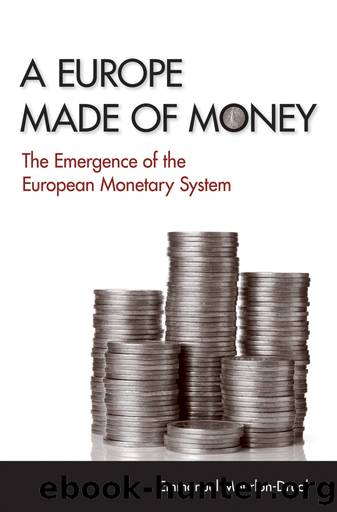A Europe made of money by Emmanuel Mourlon-Druol

Author:Emmanuel Mourlon-Druol [Mourlon-Druol, Emmanuel]
Language: eng
Format: epub
Tags: History, Europe, General, Political Science, Political Economy, History & Theory
ISBN: 9780801465932
Google: v_2tDwAAQBAJ
Publisher: Cornell University Press
Published: 2012-07-11T01:10:40+00:00
Outlining a Brand-New Scheme? The Work of the Schulmann-Clappier-Couzens Group
The work of the ad hoc group composed of Horst Schulmann, Bernard Clappier, and Kenneth Couzens certainly remains one of the most unclear parts of the EMS story. Information about when and where they met and what was said by the âGang of Three,â as Ludlow calls them, remains uncertain.68 According to the British archival record, the Group of Three met three times (on 12 May at the Banque de France in Paris; on 26 May in Washington; and again in Paris on 14June). Couzens and Schulmann (no one else was present) met separately a first time after the Copenhagen summit on 20 April, while Clappier and Schulmann met a last time in Hamburg, together with Giscard and Schmidt, but without Couzens, just before the issuing of the Schulmann/Clappier draft.69 Since a study of their meetings is absent from the literature, in this section I will analyze their work through a strict chronological reconstruction. The idea that guided their work from the very beginning was to eventually provide a paper that would be âa semi-secret Franco-German statement of methods and objectives.â70
The first Schulmann-Couzens meeting took place a few days before another important meeting between Schmidt and Callaghan, on 23 April. The reasons for such a separate meeting, in the absence of Clappier, are slightly obscure. A possible answer lies in the fact that the German side was well aware that the British government would be harder to convince than the French. This could explain why Schulmann did not regard the need for a proper trilateral meeting as urgent. It was recorded that at the end of the meeting he simply said that he envisaged a joint meeting with Clappier would be necessary âat some stage.â71
Since there was still no paper setting out Schmidtâs plan in more detail, this meeting of Couzens and Schulmann was only about âphilosophy, not specificsâ of monetary cooperation: âWhat seemed to be in his [Schulmannâs] mind (and perhaps therefore in the mind of Herr Schmidt) was to seek a philosophical (if not emotional) commitment to a broad concept of linked European currencies and a Europe more self-reliant in monetary matters.â72 Apart from a timid positive remark by Schulmann, who stressed that the three main European countries had moved closer economically in 1976â1977, the rest of this first exchange of views was hardly positive, particularly on the British side. Couzens first openly doubted the rationale behind Schmidtâs Europe-centered, monetary-exclusive endeavor.73 He then discussed how difficult it would be for the British government to take a new step in European integration during a potential election year. Callaghan made a similar point on the afternoon of that same day.74 If both had domestic political considerations in mind, it must also be noted that, in more general terms, it could be economically risky to enter a near-fixed exchange rate system of the EMS type in an electoral period, since this could well nurture speculation and currency pressure. It was, in a
Download
This site does not store any files on its server. We only index and link to content provided by other sites. Please contact the content providers to delete copyright contents if any and email us, we'll remove relevant links or contents immediately.
Harry Potter and the Goblet Of Fire by J.K. Rowling(3025)
Never by Ken Follett(2873)
Shadow of Night by Deborah Harkness(2710)
Ogilvy on Advertising by David Ogilvy(2678)
Zero to IPO: Over $1 Trillion of Actionable Advice from the World's Most Successful Entrepreneurs by Frederic Kerrest(2377)
The Man Who Died Twice by Richard Osman(2291)
Machine Learning at Scale with H2O by Gregory Keys | David Whiting(2269)
Book of Life by Deborah Harkness(2259)
How Proust Can Change Your Life by Alain De Botton(2256)
My Brilliant Friend by Elena Ferrante(2219)
0041152001443424520 .pdf by Unknown(2214)
The Tipping Point by Malcolm Gladwell(2202)
How to Pay Zero Taxes, 2018 by Jeff A. Schnepper(2095)
Will by Will Smith(2033)
Purple Hibiscus by Chimamanda Ngozi Adichie(1979)
Hooked: A Dark, Contemporary Romance (Never After Series) by Emily McIntire(1933)
Borders by unknow(1780)
Rationality by Steven Pinker(1761)
Daughter of Smoke and Bone by Laini Taylor(1738)
